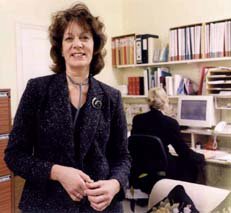£10,000 book award long list
Also in today's blog
211 entries strain credulity
Oxford literary agency
Booksurge POD
My money is on Douglas Kennedy
Journalists killed
The shortlist for the Romantic Novel of the Year Award 2006 will be announced next Friday [February 10] and the winner on 20 April. Meanwhile the jackets of the 23 titles on the long list are on view here.
The three judges who will decide which author leaves the award lunch at the Savoy Hotel with a cheque for £10,000 [ US $17,705, Aus $23,487 ] in her or his pocket are
Sue Baker, books editor at Publishing News whose column is required reading for all writers who take their profession seriously,
Matt Bates, fiction buyer at WHSmith Travel,
and, in the chair, Dr Susan Horsewood-Lee [see photo], a busy general physician in central London.

At first I was surprised that any GP would have time to add six novels to her regular reading. But a visit to Dr Susan's site makes it clear that she is a woman of formidable energy.
211 entries strain credulity
"After impassioned debate," we are told,"the list was whittled down from a record 211 entries…"
That in twelve months, 211 books worthy to be considered the best romantic novel of the year were published in the UK strains my credulity. I can't believe that every month for a year, four romantic novels of outstanding quality were published. One is forced to conclude that some authors and publishers, lured by the £10,000 prize funded by Foster Grant Reading Glasses, entered books that fall somewhat short of the standard one would expect.
Not that lasting lustre has always been achieved in the past. Looking at the list of winning titles from 1960 to 2000, I could find only five authors who are still big names. In alphabetical order, they are
Elizabeth Buchan [39,095]
Audrey Howard [30,217]
Rosamunde Pilcher [10,557]
Rosie Thomas [17,396]
Joanna Trollope [41].
The figures in brackets are Amazon UK sales ranks.
Of course the Sixties and Seventies are a long time ago. Many of the early winners have died. Mary Howard, the first winner who received her award from novelist H E Bates, was extremely popular in her day but her books are hard to trace now.

You might like to compare your reactions to the 23 jackets with mine. After careful study, I decided that
14 of them would not have grabbed my attention in a bookshop because six looked like chicklit, six appeared to be sagas and two looked historical, none of which, with rare exceptions, I read unless I run out of the kind of books I prefer and am left with no choice, any book being better than none.
Of the remaining nine titles, two were by writers who have disappointed me in the past and five just didn't look my sort of book. The only jackets that appealed were Pond Lane to Paris and True Believer.
Pond Lane to Paris, Susan Vereker's début novel, I bought last summer on the strength of its jacket and title and as a gesture of support for a new publishing house, Transita. I blogged about it on 5 June 2005 under the heading "First library visit in eight months".

I liked the jacket of Nicholas Sparks' True Believer, but his latest novel has a "ghost" element which I should find hard to swallow.
It's worrying that so many books on the long list are being marketed as saga or chick. Large publishers seem determined to fit writers into categories rather than promoting them as exciting individuals. But perhaps that's because many of today's women writers are following popular trends and editorial suggestions rather than listening to their inner voices like the great romantic novelists of earlier decades.

Despite its unappealing [to me] jacket, I clicked on the book by the only other man on the long list, Douglas Kennedy. The details about him at his publisher's website are sparse.
"Douglas Kennedy's novels - The Dead Heart, The Big Picture, The Job, The Pursuit of Happiness and A Special Relationship - have all been highly praised bestsellers. He is also the author of three acclaimed travel books: Beyond the Pyramids, In God's Country, and Chasing Mammon. His work has been translated into sixteen languages. Born in Manhattan in l955, he lives in London with his wife and two children."
Oxford literary agency
Unable to find his website, I emailed his agent Antony Harwood to ask if a site was in the offing.
The history of this agency is interesting.
The Antony Harwood Ltd literary agency was set up in London in 2000 by Antony Harwood and James Macdonald Lockhart and moved to Oxford in 2003.
Antony Harwood started out in publishing at Chatto & Windus in 1978, working as a Production assistant, head of the Publicity Department and Commissioning Editor. After six years at Chatto (during which time he had the privilege of working with authors such as Angela Carter, Toni Morrisson and Iris Murdoch), he moved over to agenting with Gillon Aitken. Having established his own list of authors and worked closely with Andrew Wylie, Aitken's then associate in America, and having become a Director of the agency, Antony joined the board of the Curtis Brown Group in 1990. In 1995 he returned to work with Gillon Aitken and in 2000 decided that it was time to become an independent agent.
James Macdonald Lockhart's first job in publishing was at Hodder Headline and he joined Gillon Aitken Associates in 1998. After two years there, he joined Antony to set up the new agency.
BookSurge POD
Looking for Douglas Kennedy's Chasing Mammon at Amazon UK, I came upon a notice I haven't seen before. Something like "Do you own the rights to this book?" Stupidly, I failed to copy it and it had disappeared when I went back. However I did save the text from the BookSurge page to which it led. The opening paragraph is
Did you know that you can take advantage of the latest print-on-demand (POD) technology to sell your out-of-print or out-of-stock books? If you are a publisher, an author, or another rights holder who would like to make a book available again to the public, we can help. Contemplating the value of an offset print run for an out-of-stock title? Print-on-demand can create an economic advantage for these titles as well. Amazon.com offers digital storage and print-on-demand (POD) services through BookSurge. BookSurge provides inventory-free fulfillment services that allow you to make your book available for sale at any level of demand through Amazon.com and other sales channels in just a few weeks.
This seemed to ring a bell and to be the kind of thing Grumpy Old Bookman comments on. Sure enough there is a GOB reference to BookSurge in his 9 December 2005 blog under the heading "Amazon v. Gotham (or old publishing v. new)"
My money is on Douglas Kennedy
Kennedy's novel is described at Amazon thus
Hannah Buchan leads an orderly life in a small town in Maine - a schoolteacher, married to a doctor, with two grown up children. However, her past conceals a dark secret. Thirty years ago she had a brief, dangerous fling with Tobias Judson, a high profile student activist, which she had reconciled [sic] to that internal, off-limits attic room marked "Ancient History." But when Tobias suddenly pops up out of nowhere with a book about his radical years, her life goes into free-fall. And before she knows it, Hannah discovers that a long-ago transgression is never really forgotten.
[Did the writer of the blurb mean relegated rather than reconciled?]
I've been trying to imagine what kind of youthful transgression could upset a long, rock-solid marriage and so far haven't come up with any possibilities. Curiosity will oblige me to buy the book which my guess is the one most likely to win the award. Shall await Friday's short list with interest.
[It turns out that Douglas Kennedy was in the US last week but I'm hoping to email-interview him about why he doesn't have a website for next Sunday's blog].
Journalists killed
When I was a junior reporter on the weekly paper at the UK seaside resort of Great Yarmouth which, in those days, was also one of the Scottish herring fishing fleet ports, another reporter, who was on the Army reserve, was re-called and sent to fight in Korea where he lost an arm.
I was reminded of him on reading the appalling number of journalists who have been killed in recent conflicts. There is a detailed list at the World Association of Newspapers site.
